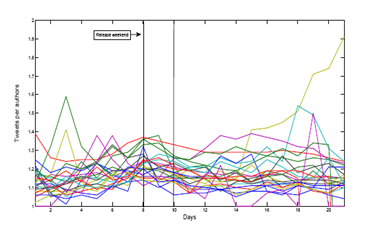Twitter Used to Predict Box Office Revenues
One of the great promises of the social media revolution is that the ability to track people’s interest in things in real time. This is the marketeer’s dream: to guage demand of things like gadgets, games and other products on a day to day basis.

Today, Sitaram Asur and Bernardo Huberman at HP Labs in Palo Alto show social media data can be used not just guage day to day inerest in movies but to predict their future box office revenue.
Their method is simple. Asur and Huberman simply counted the number of times that a film title was mentioned on the social media service Twitter.com, a microblogging site enjoying huge popularity and boasting some 23 million users. Intotal they counted some 3 million tweests about film over about 3 months.
The results are a fascinating insight into the power and limitations of Twitter. Asur and Huberman found that the rate at which people produce tweets about movies can accurately forecast the box office revenue of the film, but only after it is released.
And the predictions from tweets are more accurate than any other method of forecasting.
Film studios and others do this in variouys ways to gauge the popularity of their products. One indicator is the amount of money they spend on advertising. Asur and Huberman say this may be linked to rate of twittering before a movie is released. Others methods of forecasting include focus groups and exit polls of people who have seen the film.
But the most accurate is the Hollywood Stock Exchange, a market in which people can buy and sell virtual shares in actors, directors and individual movies. Researchers have long known that these kinds of virtual stock markets appear to tap into the wisdom of the crows to make uncannily accurate predictions about everything from the outcome of elections to price of real stocks. The Hollywood Stock Exchange produces unusually accurate predictions about the popularity of films.
However, when it comes to the accuracy of forcecasts, counting the rate of tweeting trounces the Hollywood Stock Exchange, say Asur and Huberman: “Our predictions are consistently better than those produced by an information market such as the Hollywood Stock Exchange, the gold standard in the industry.”
That will delight the founders of Twitter and the ecosystem of websites and services that have sprung up around it. These services have enjoyed enormous popularity but have yet to demonstrate their commercial worth.
However, it also raises an interesting new question for advertisers and marketing executives. Can they change the demand for their film, product or service buy directly influencing the rate at which people tweet about it? In other words, can they change the future that tweeters predict?
There’s only one way to find out and it’ll require a substantial investment in marketing and advertising. Tweeters be warned!
Ref: arxiv.org/abs/1003.5699: Predicting the Future With Social Media
Keep Reading
Most Popular
Large language models can do jaw-dropping things. But nobody knows exactly why.
And that's a problem. Figuring it out is one of the biggest scientific puzzles of our time and a crucial step towards controlling more powerful future models.
The problem with plug-in hybrids? Their drivers.
Plug-in hybrids are often sold as a transition to EVs, but new data from Europe shows we’re still underestimating the emissions they produce.
Google DeepMind’s new generative model makes Super Mario–like games from scratch
Genie learns how to control games by watching hours and hours of video. It could help train next-gen robots too.
How scientists traced a mysterious covid case back to six toilets
When wastewater surveillance turns into a hunt for a single infected individual, the ethics get tricky.
Stay connected
Get the latest updates from
MIT Technology Review
Discover special offers, top stories, upcoming events, and more.